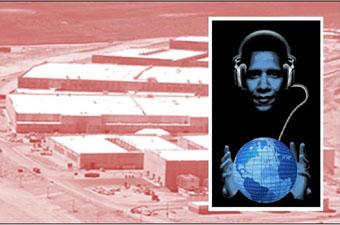
The President, Congress & Reining-In the NSA
| published Thursday, January 9, 2014 |
By R. Alan Clanton | published Thursday, January 9, 2014 |
Thursday Review editor
In what may be a significant turning point in the nine-month controversy surrounding the National Security Agency’s wide surveillance program targeting millions of Americans’ cell phones, landline numbers, emails and text messaging activity, the White House is considering a proposal to scale back the NSA’s power to collect and store that data.
More importantly, perhaps, is the specific option of stripping the NSA of its authority to collate and store phone records indefinitely—cell calls or landline calls—for constant data mining or for periodic analysis. Under this proposal the NSA would be required to seek a court order or subpoena for such data from phone companies and mobile service providers, and then only if the agency could demonstrate probable cause. One component of this proposal would enable a third party firm or organization to maintain those records, which could be released to the NSA or other agencies only upon court order.
The new proposals come as a result of the special panel convened by President Obama nears completion of its full report on the NSA’s activities, a huge program dating back to the middle aught years when the NSA starting its data-collection and it’s wide sweep of electronic information.
Another key point in the proposed plan, now before the President, involves a significant reduction in the NSA’s ability to spy on foreign nationals, especially political leaders and international organizations. Among the more explosive revelations to emerge after former NSA employee Edward Snowden secreted thousands of documents out of the NSA was evidence that the U.S. government was spying on foreign leaders, including the cell phone conversations of German Chancellor Angela Merkel, several European Union market regulators and business negotiators, high level conversations among leaders in Brazil, and even the emails, text messages and phone calls of international organizations.
The documents which Snowden had made available to reporters a few weeks ago showed that the NSA’s interest in those communications among foreign leaders spanned across as many as 30 countries, including U.S. allies Germany, France, Spain and the United Kingdom.
Meanwhile, the struggle between the NSA and some civil liberties groups continues its steady progression through the U.S. courts. Last month a Federal judge had ruled that some of the NSA’s activities—especially those which involved spying on Americans cell phone calls, landline activities, emails and text messaging—amounted to a serious violation of the Constitution. That judge had called the NSA’s activities “Orwellian” in their breadth and scope.
But later in December, Judge William Pauley of the U.S. District Court of Appeals (Southern District of N.Y.) ruled in favor of the NSA, stating in his ruling that issues of U.S. national security should trump concerns about privacy. The ACLU, using in part the Freedom of Information Act (FOIA), immediately said it would appeal the decision, indicating that its position was based on the fact that the NSA’s programs cast a wide net even with the collection of its foreign intelligence, inevitably dragging in the private information of Americans with no connection to terror or international criminal activity.
The issue seems on a legal trajectory for the U.S. Supreme Court.
On Wednesday of this week, President Obama met with members of a separate oversight board, created by Congress in the wake of the widening turmoil surrounding the NSA’s activities, to discuss other options. Members of the Congressional oversight board said that they plan to issue their own full report later this month.
The White House, which plans to have a roundtable meeting Friday with the chiefs of several large technology companies, says that the President will discuss his concerns with those business leaders, as well as address their questions. Since Snowden’s leaks hit the press last spring, reports have varied as he to the extent of cooperation many of these technology companies offered the NSA. After explosive revelations last week that NSA hackers had developed a backdoor application for harvesting virtually all data from smart phones, Apple Computer to the unusual step of releasing a statement declaring that it had no knowledge of any such app, and that it had not cooperated with the NSA or other security agencies.
Still, some of the earlier documents Snowden had released to the press seemed to indicate widespread—if not sometimes reluctant—cooperation with the NSA’s data harvesting, and those iconic names included AT&T, Microsoft, Verizon, Google, Yahoo, AOL and others.
The White House has said the President is not yet ready to make an official decision, but in the meantime several House and Senate proposals are already making their way through Congress—legislation which, if passed, would greatly reduce the NSA’s latitude in harvesting the data of America citizens.
In contrast, some members of Congress support the key figures in the intelligence community who have petitioned the President to leave the NSA’s surveillance programs intact. They fear any major dismantling of those programs would open the door to the threat of terror, since those data-mining tools are seen as the most direct path toward intervention and interdiction in terror plots.
To read related Thursday Review articles on this topic:
Turnkey Tyranny: Or, If I Am Not Doing Anything Wrong, I Have Nothing to Fear, Right?; January 6, 2014.
The NSA Super Hackers (And Your Cell Phone Secrets); December 31, 2013.
Thwarting Terror: How Much of Your Personal Data is Enough?; December 27, 2013.
Your Best Secrets Worth Tracking, and Keeping; June 8, 2013.
